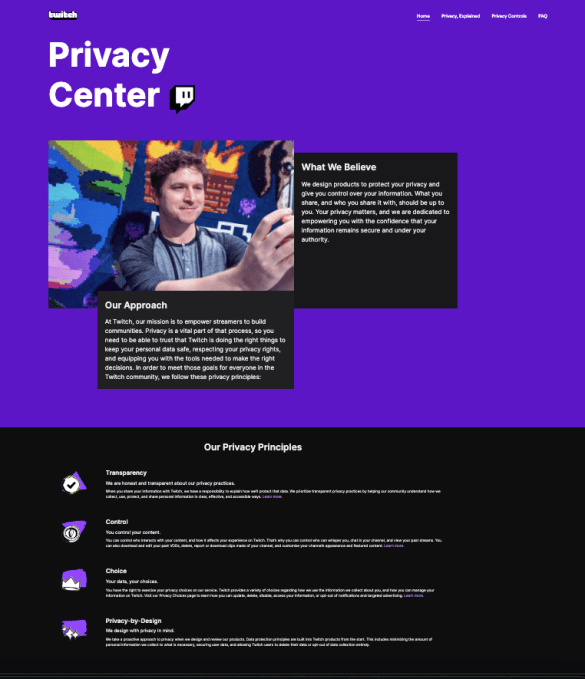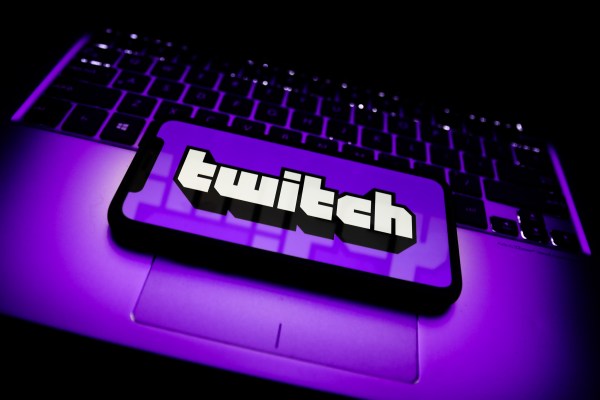In the name of transparency and accessibility, Twitch launched its new Privacy Center to educate users, after conducting “extensive research” and finding that many of its users had no idea how their personal data is collected and used.
The Privacy Center, which launched on Thursday, is designed to provide “clear, actionable information” about privacy rights, Mel de Leon, Twitch’s principal Product Manager of Privacy said in a statement to TechCrunch. The project was created with “meaningful transparency and usability.”
“Community feedback was core to our development process,” de Leon said in a statement to TechCrunch. “We drew on conversations with folks who use our service, and then built in explainers that addressed questions they’d raised — how to keep track of privacy preferences, how is user data utilized across Twitch, and at base level, how is personal data defined.”
Twitch’s user base skews younger; the company reports that in 2022, more than 70% of its viewers were between 18 and 34. Personal data may not be as much of a concern for their users, even if they’re avid gamers.

Twitch’s new Privacy Center is geared toward informing users about what their personal data is, and how it might be collected and used. Image Credits: Screenshot via Twitch
Through surveys and small group settings, Twitch concluded that many creators and viewers remembered making privacy selections, but didn’t remember what they picked or how to check what they picked. They also didn’t know how “personal data” was defined, by Twitch and across the internet. Users also didn’t have a “good sense” of how their data was being used on the platform, Twitch said.
“We think that privacy information has to be understandable, otherwise it isn’t really useful. Regardless of intention, if the info isn’t shared in a clear and accessible way, it’s a lot less valuable to the end user, and even less actionable,” Twitch said in the press release. “We weren’t looking to create more work for our community, or provide a complex web to sift through under the guise of ‘transparency.’ So, we did a lot of work to get rid of the legalese and corporate speak.”
Regulating social media platforms is a beast, and sites like Twitch abide by a mishmash of guidelines set by federal agencies and local laws that can vary by country and region. To comply with the EU’s General Data Protection Regulation, websites are required to obtain user consent to collect and use their personal data. While most sites prompt users to opt in or out of data collection, the pop-ups don’t always explain what users are consenting to.
Twitch’s Privacy Center includes resources about how the data that users share might be handled, and the company said it distinguishes between “general, good to know definitions” that apply across the broader social media landscape, and “in-depth” information about Twitch-specific users. The Privacy Center is also a hub for users to control their own data collection and use, and lets users access copies of their personal data and provides clear explanations for its opt out tools. Opting out of ad tracking on a mobile device, for example, is explained as “saying no to your personal data being leveraged to enhance your advertising experience while on the Twitch platform.”
The Privacy Center also establishes “Privacy Principles,” which Twitch stated is to “ground and guide” its ongoing privacy work. In addition to “Transparency,” “Control” and “Choice,” Twitch vows to “design with privacy in mind” by building products that minimize the collection of personal information, secure user data and allow users to delete their existing data.
“Our community should be able to trust that Twitch is doing the right thing to keep their personal data safe, that we are respecting their privacy rights, and giving them the info they need to make informed decisions about their Twitch experience,” Twitch continued.
Of course, it’s fair to approach any social platform’s data collection promises with skepticism. After all, plenty of sites publicly claimed that they weren’t collecting and using their users’ data, while continuing to collect and use their users’ data. TikTok, for example, denies using biometric data gleaned from users, but its privacy policy includes a vague clause that says it may collect “biometric identifiers and biometric information as defined under U.S. laws, such as faceprints and voiceprints.” The policy doesn’t clarify why this information may be collected or how it might be shared.
In Twitch’s case, the Privacy Center alone isn’t a guarantee that users’ personal data will be safe. But making an effort to educate its young, and possibly naïve, audience about their privacy rights is a start.
